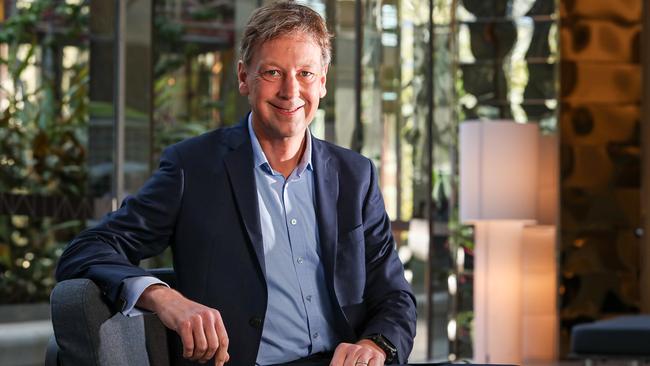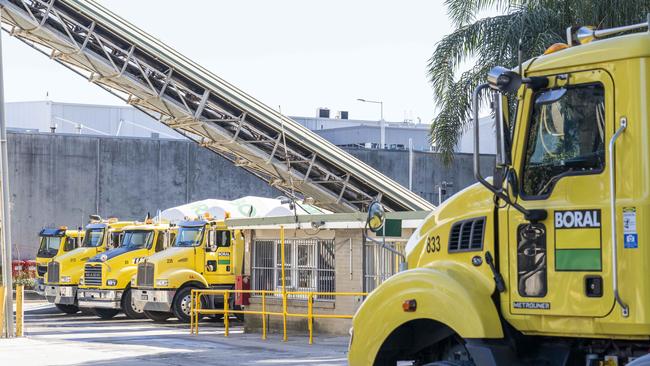
Shaw analyst Peter O’Connor summed up the market’s reaction as “phew, it’s a beat”, with better than expected earnings, but the big winner was $US9.1bn in dividends at an impressive payout ratio of 75 per cent.
Shareholders must be impressed but more with the work behind the numbers, with Stausholm prepared to take the time to talk to investors and they expressed confidence his relationship with native title holders was better.
Total dividends came out less than free cash flow at more than $US10.1bn with the company reporting net cash on the balance sheet for the first time since the ill-fated Alcan acquisition in 2008.
In contrast with his predecessor, Stausholm is quick to acknowledge the challenges which is a step towards redemption.
“There is still definitely room for improvement,” he said and noted ESG performance was a key concern with the company aiming for impeccable credentials.
It is a long way short on that metric right now.
Production is an issue in the Pilbara with the company falling behind returns from rival BHP and Covid is playing havoc with costs, with labour in short supply due to closed borders.
Before the profit release Rio confirmed the decision to progress its Serbian lithium project which obviously meets demand for battery minerals.
Production starts in 2026 and is forecast to grow by at least 30 per cent a year.
But lithium is not iron ore, which accounts for 66 per cent of Rio’s sales and 77 per cent of earning,s and in what most see as secular decline and certainly cannot be expected to maintain a price at more than $US200 a tonne.
It’s a magnificent business operating on profit margins of 79 per cent, up 7 per cent from year ago levels even with unit costs up 9 per cent.
There is still clearly demand for iron ore and as Stausholm noted China’s economy continues to grow impressively, but long term it will look for alternate supply to Australian ore.
Rio is 9 per cent owned by China which helps but 85 per cent of the miner’s output goes to a country which is growing increasingly hostile.
When a company reports return on equity at 50 per cent it seems wrong to express caution and in fact the good news is it is the company itself which is quick to note it has room for improvement.
That is a different Rio which offers real hope.
-
Longo lays down law
The now Melbourne-based chief corporate plod, Joe Longo, has served in the job since June 1, but has yet to officially talk with the media. That changes this week with a Radio National interview in which he will lay down his priorities and defend the use of credible and appropriate enforceable undertakings.
The enforcement tool went out of fashion post the Hayne royal commission and “why not litigate” mantra.
The point being when used well undertakings achieve the objective.
-
Coup de gras
Ryan Stokes has spent $4.5bn buying an estimated 65 per cent of the 74-year-old building group Boral.
Now comes the capital return to help pay for Seven Group’s debt-funded bid, which closes on Thursday afternoon.
Step one for Stokes and Seven will be to take the chair at Boral, replacing Kathryn Fagg, and then working with CEO Zlatko Todorcevski on executing a recovery for the group.
Stokes said in May he would be happy with 30 per cent from his $6.50-a-share bid. That was when he was sitting on 23 per cent of the company.

He courageously didn’t set a minimum acceptance condition on his bid which acknowledged the different motives of the bigger shareholders.
The trigger was the June 21 announcement from Boral it had sold the US assets for a better than expected $2.9bn, which pushed the Boral stock price up from $6.85 to $7.15.
The news meant if Stokes wanted more stock he had to increase the bid price, which he did the very next day, from $6.50 to $7.40.
While publicly protesting about the timing of the US deal it also gave Stokes the confidence to raise his offer.
While the takeover played out Boral helped Stokes by firstly imposing no conditions on his original demand for two board seats, then continued its stock buyback to help him up the register. But the cream on the cake was the better-than-expected price of $2.9bn Boral got for its US assets.
In the near future Boral will close the sale on its fly ash assets which will return about $1.1bn, working out at about $4 a share in surplus cash. Not bad for a stock trading at $7.40.
For his first trick Stokes will want to get his hands on the cash, which will probably come via a capital return.
Boral has $1bn in debt which will be added to the Seven Group debt but there is now a big cash pile waiting to cut the borrowings.
Fagg has had a tumultuous reign at Boral, showing Mike Kane the door, hiring Todorcevski and executing on the promise to focus the company.
She has achieved all this and if she can be criticised it is for opening the door too widely for Stokes to march in and take control on the cheap at below the independent expert’s valuation range.
He has executed the deal superbly. Stokes is being advised by Barrenjoey and Boral by Citi, Flagstaff and Jarden.
Control of Boral passed long ago and with Stokes on more than 61 per cent it is conceivable by Thursday afternoon that he gets to 65 per cent-plus.
The Seven stock price has increased by 20 per cent since the bid began in May and is now trading at near five-year highs of $23.68, which shows that the market thinks Stokes is buying Boral cheaply.
His roughly 65 per cent stake has cost about $4.5bn and works out at $830m less than the target’s $8.2bn in market value.
Having started buying when Boral was at its Covid lows of around $2 Stokes has paid up for his final 40 per cent at $7.40 but demonstrably is well ahead.
Now he has the chance to make even more money by running the assets well.
Having lost their chance for anything close to a control premium, that is what remaining minority shareholders will also be hoping for.







In his seven months as Rio boss Jakob Stausholm has faced myriad negatives akin to a bucket full of holes, but his first profit release came in ahead of estimates and showed a welcome realisation of the problems ahead. To talk about problems for a company earning more than 50 per cent returns and debt free for the first time in a dozen years seems odd, but instead highlights the upside under its new leadership.